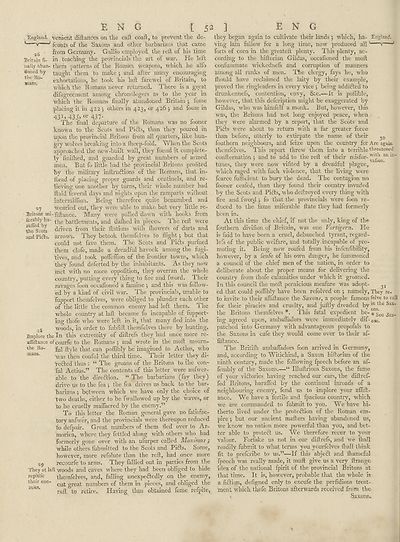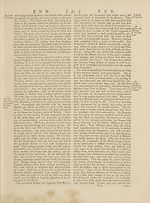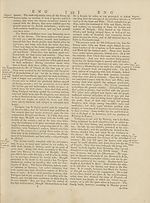Encyclopaedia Britannica, or, a Dictionary of arts, sciences, and miscellaneous literature : enlarged and improved. Illustrated with nearly six hundred engravings > Volume 8, ELE-FOR
(64) Page 52
Download files
Complete book:
Individual page:
Thumbnail gallery: Grid view | List view

the Ro
vans.
-7
raffed by
the Scots
and Piets.
ENG [52
England, venient diftances on the call coait, to prevent the de-
'——v'—i'cants of the Saxons and other barbarians that came
26 from Germany. Gallio employed the reft of his time
Britain fi- in teaching the provincials the art of war. He left
iially aban- them patterns of the Roman weapons, tv Inch he alio
doned by taught them to make ; and after many encouraging
exhortations, he took his laft farewel of Britain, to
which the Romans never returned. There is a great
difagreement among chronologers as to the year in
which the Romans finally abandoned Britain j fome
placing it in 422 ; others in 423, or 426 ; and fome in
43G 435, or 437-
The final departure of the Romans was no looner
known to the Scots and Piets, than they poured in
upon the provincial Britons from all quarters, like hun¬
gry wolves breaking into a fheep-fold. When the Scots
approached the new-built wall, they found it complete¬
ly linilhed, and guarded by great numbers of armed
men. But fo little had the provincial Britons profited
by the military inftruftions of the Romans, that,in-
ftead of placing proper guards and centinels, and re¬
lieving one another by turns, their whole number had
ftaid feveral days and nights upon the ramparts without
intefmiffion. Being therefore quite benumbed and
wearied out, they were able to make but very little re-
Britons mi - fiftance. Many were pulled down with hooks from
ferably ha- tge battlements, and dallied in pieces. The reft were
driven from their ftations with Ihowers of darts and
arrowy. They betook themfelves to flight •, but that
could not fave them. The Scots and Piets purfued
them clofe, made a dreadful havock among the fugi¬
tives, and took pofleffion of the frontier towns, which
they found deferted by the inhabitants. As they now
met with no more oppofition, they overran the whole
country, putting every thing to fire and fword. Their
ravages foon occafioned a famine •, and this was follow¬
ed by a kind of civil war. The provincials, unable to
fupport themfelves, were obliged to plunder each other
of the little the common enemy had left them. 'I he
whole country at laft became fo incapable of fupport-
ing thofe who were left in it, that many fled into the
,2 woods, in order to fubfift themfelves there by hunting.
Implore the In this extremity of diftrefs they had once more re-
affiftance ofcourfe to the Romans ; and wrote in the moft mourn-
the Ro- fui ftyle that can poflibly be imagined to Aetius, who
mans. was tben conful the third time. Their letter they di-
recled thus : “ The groans of the Britons to the con¬
ful Aetius.” The contents of this letter Avere anfwer-
able to the direiftion. “ The barbarians (fay they)
drive us to the fea 5 the fea drives us back to the bar¬
barians 5 between which we have only the choice of
two deaths, either to be fwallowed up by the Avaves, or
to be cruelly maflacred by the enemy.”
To this letter the Roman general gave no fatisfac-
tory anfwer, and the provincials Avere thereupon reduced
to defpair. Great numbers of them fled over to Ar¬
morica, Avhere they fettled along Avith others vvho had
formerly gone over Avith an ufurper called Maximus ;
Avhile others liibrnitted to the Scots and Pi6ts. Some,
however, more refolute than the reft, had once more
recourfe to arms. They fallied out in parties from the
They at laft woods and caves Avhere they had been obliged to hide
repivffe themfelves, and, falling unexpe&edly on the enemy,
their enc- ^ great numbers of them in pieces, and obliged the
reft to retire. Having thus obtained fome refpite,
]
ENG
they began again to cultivate their lands ; which, ha- England,
ving lain falloAV for a long time, noAV produced all1 1 r"v'
forts of corn in the greateft plenty. This plenty, ac¬
cording to the hiftorian Giidas, occafioned the moft
confummate Avickednefs and corruption of manners
among all ranks of men. The clergy, fays he, Avho
fliould haAre reclaimed the laity by their example,
proved the ringleaders in every vice , being addicted to
drunkennefs, contention, envy, &c.—It is poflible,
however, that this defeription might be exaggerated by
Giidas, Avho Avas himfelf a monk. But, hoAvever, this
Avas, the Britons had not long enjoyed peace, when
they AArere alarmed by a report, that the Scots and
Piets Avere about to return Avith a far greater force
than before, utterly to extirpate the name of their ,0
fouthern neighbours, and feize upon the country for A re again
themfelves. This report threAV them into a terrible tlircatcned
con ft er nation ; and to add to the reft of their misfor- in"
tunes, they were iioav vifited by a dreadful plague,
Avhich raged Avith fuch violenee, that the living Avere
fcarce fuflicient to bury the dead. The contagion no
fooner ceafed, than they found their country invaded
by the Scots and Pi£ts, Avho deftroyed every thing Avith
fire and fword } fo that the provincials Avere foon re¬
duced to the fame miferable ftate they had formerly-
been in.
At this time the chief,, if not the only, king of the
fouthern divifion of Britain, Avas one Vortigern. Pie
is faid to have been a cruel, debauched tyrant, regard-
lefs of the public Avelfare, and totally incapable of pro¬
moting it. Being noAV roufed from his infenfibility,
however, by a fenfe of his oAvn danger, he fummoned
a council of the chief men of the nation, in order to
deliberate about the proper means for delivering the
country from thofe calamities under Avhich it groaned.
In this council the moft pernicious meafure Avas adopt-
ed that could poflibly have been refolved on ; namely, They re-
to invite to their afliftance the Saxons, a people famous foBe to call
for their piracies and cruelty, and juftiy dreaded byin ti‘e Sax'
the Britons themfelves *. This fatal expedient be- * s‘ec Sax_
ing agreed upon, ambaffadors Avere immediately dif- onu
patched into Germany with advantageous propofals to
the Saxons in cafe they Avould come over to their af-
fiftance.
The Britifh ambafladors foon arrived in Germany,
and, according to Witichind, a Saxon hiftorian of the
ninth century, made the folloAving fpeech before an af~
fembly of the Saxons.—“ Illuftrious Saxons, the fame
of your viflories having reached our ears, the diftref-
fed Britons, haraffed by the continual inroads of a
neighbouring enemy, fend us to implore your affift-
ance. We have a fertile and fpacious country, Avhich
Ave are commanded to fubmit to you. We have hi¬
therto lived under the protection of the Roman em¬
pire 5 but our ancient mailers having abandoned us,
Ave knoAV no nation more powerful than you, and bet¬
ter able to proteft us. We therefore recur to your
valour. Forfake us not in our diftrefs, and Ave fhall
readily fubmit to Avhat terms you yourfelves (ball think
fit to preferibe to us.”—If this abieCt and thameful
fpeech Avas really made, it muft give us a very ftrange
idea of the national fpirit of the provincial Britons at
that time. It is, hoAvever, probable that the whole is
a fiCtion, defigned only to excufe the perfidious treat¬
ment Avhich thefe Britons aftenvards received from the
\ Saxons*
vans.
-7
raffed by
the Scots
and Piets.
ENG [52
England, venient diftances on the call coait, to prevent the de-
'——v'—i'cants of the Saxons and other barbarians that came
26 from Germany. Gallio employed the reft of his time
Britain fi- in teaching the provincials the art of war. He left
iially aban- them patterns of the Roman weapons, tv Inch he alio
doned by taught them to make ; and after many encouraging
exhortations, he took his laft farewel of Britain, to
which the Romans never returned. There is a great
difagreement among chronologers as to the year in
which the Romans finally abandoned Britain j fome
placing it in 422 ; others in 423, or 426 ; and fome in
43G 435, or 437-
The final departure of the Romans was no looner
known to the Scots and Piets, than they poured in
upon the provincial Britons from all quarters, like hun¬
gry wolves breaking into a fheep-fold. When the Scots
approached the new-built wall, they found it complete¬
ly linilhed, and guarded by great numbers of armed
men. But fo little had the provincial Britons profited
by the military inftruftions of the Romans, that,in-
ftead of placing proper guards and centinels, and re¬
lieving one another by turns, their whole number had
ftaid feveral days and nights upon the ramparts without
intefmiffion. Being therefore quite benumbed and
wearied out, they were able to make but very little re-
Britons mi - fiftance. Many were pulled down with hooks from
ferably ha- tge battlements, and dallied in pieces. The reft were
driven from their ftations with Ihowers of darts and
arrowy. They betook themfelves to flight •, but that
could not fave them. The Scots and Piets purfued
them clofe, made a dreadful havock among the fugi¬
tives, and took pofleffion of the frontier towns, which
they found deferted by the inhabitants. As they now
met with no more oppofition, they overran the whole
country, putting every thing to fire and fword. Their
ravages foon occafioned a famine •, and this was follow¬
ed by a kind of civil war. The provincials, unable to
fupport themfelves, were obliged to plunder each other
of the little the common enemy had left them. 'I he
whole country at laft became fo incapable of fupport-
ing thofe who were left in it, that many fled into the
,2 woods, in order to fubfift themfelves there by hunting.
Implore the In this extremity of diftrefs they had once more re-
affiftance ofcourfe to the Romans ; and wrote in the moft mourn-
the Ro- fui ftyle that can poflibly be imagined to Aetius, who
mans. was tben conful the third time. Their letter they di-
recled thus : “ The groans of the Britons to the con¬
ful Aetius.” The contents of this letter Avere anfwer-
able to the direiftion. “ The barbarians (fay they)
drive us to the fea 5 the fea drives us back to the bar¬
barians 5 between which we have only the choice of
two deaths, either to be fwallowed up by the Avaves, or
to be cruelly maflacred by the enemy.”
To this letter the Roman general gave no fatisfac-
tory anfwer, and the provincials Avere thereupon reduced
to defpair. Great numbers of them fled over to Ar¬
morica, Avhere they fettled along Avith others vvho had
formerly gone over Avith an ufurper called Maximus ;
Avhile others liibrnitted to the Scots and Pi6ts. Some,
however, more refolute than the reft, had once more
recourfe to arms. They fallied out in parties from the
They at laft woods and caves Avhere they had been obliged to hide
repivffe themfelves, and, falling unexpe&edly on the enemy,
their enc- ^ great numbers of them in pieces, and obliged the
reft to retire. Having thus obtained fome refpite,
]
ENG
they began again to cultivate their lands ; which, ha- England,
ving lain falloAV for a long time, noAV produced all1 1 r"v'
forts of corn in the greateft plenty. This plenty, ac¬
cording to the hiftorian Giidas, occafioned the moft
confummate Avickednefs and corruption of manners
among all ranks of men. The clergy, fays he, Avho
fliould haAre reclaimed the laity by their example,
proved the ringleaders in every vice , being addicted to
drunkennefs, contention, envy, &c.—It is poflible,
however, that this defeription might be exaggerated by
Giidas, Avho Avas himfelf a monk. But, hoAvever, this
Avas, the Britons had not long enjoyed peace, when
they AArere alarmed by a report, that the Scots and
Piets Avere about to return Avith a far greater force
than before, utterly to extirpate the name of their ,0
fouthern neighbours, and feize upon the country for A re again
themfelves. This report threAV them into a terrible tlircatcned
con ft er nation ; and to add to the reft of their misfor- in"
tunes, they were iioav vifited by a dreadful plague,
Avhich raged Avith fuch violenee, that the living Avere
fcarce fuflicient to bury the dead. The contagion no
fooner ceafed, than they found their country invaded
by the Scots and Pi£ts, Avho deftroyed every thing Avith
fire and fword } fo that the provincials Avere foon re¬
duced to the fame miferable ftate they had formerly-
been in.
At this time the chief,, if not the only, king of the
fouthern divifion of Britain, Avas one Vortigern. Pie
is faid to have been a cruel, debauched tyrant, regard-
lefs of the public Avelfare, and totally incapable of pro¬
moting it. Being noAV roufed from his infenfibility,
however, by a fenfe of his oAvn danger, he fummoned
a council of the chief men of the nation, in order to
deliberate about the proper means for delivering the
country from thofe calamities under Avhich it groaned.
In this council the moft pernicious meafure Avas adopt-
ed that could poflibly have been refolved on ; namely, They re-
to invite to their afliftance the Saxons, a people famous foBe to call
for their piracies and cruelty, and juftiy dreaded byin ti‘e Sax'
the Britons themfelves *. This fatal expedient be- * s‘ec Sax_
ing agreed upon, ambaffadors Avere immediately dif- onu
patched into Germany with advantageous propofals to
the Saxons in cafe they Avould come over to their af-
fiftance.
The Britifh ambafladors foon arrived in Germany,
and, according to Witichind, a Saxon hiftorian of the
ninth century, made the folloAving fpeech before an af~
fembly of the Saxons.—“ Illuftrious Saxons, the fame
of your viflories having reached our ears, the diftref-
fed Britons, haraffed by the continual inroads of a
neighbouring enemy, fend us to implore your affift-
ance. We have a fertile and fpacious country, Avhich
Ave are commanded to fubmit to you. We have hi¬
therto lived under the protection of the Roman em¬
pire 5 but our ancient mailers having abandoned us,
Ave knoAV no nation more powerful than you, and bet¬
ter able to proteft us. We therefore recur to your
valour. Forfake us not in our diftrefs, and Ave fhall
readily fubmit to Avhat terms you yourfelves (ball think
fit to preferibe to us.”—If this abieCt and thameful
fpeech Avas really made, it muft give us a very ftrange
idea of the national fpirit of the provincial Britons at
that time. It is, hoAvever, probable that the whole is
a fiCtion, defigned only to excufe the perfidious treat¬
ment Avhich thefe Britons aftenvards received from the
\ Saxons*
Set display mode to:
![]() Universal Viewer |
Universal Viewer | ![]() Mirador |
Large image | Transcription
Mirador |
Large image | Transcription
Images and transcriptions on this page, including medium image downloads, may be used under the Creative Commons Attribution 4.0 International Licence unless otherwise stated. ![]()
| Permanent URL | https://digital.nls.uk/192264251 |
|---|
| Attribution and copyright: |
|
|---|
| Description | Ten editions of 'Encyclopaedia Britannica', issued from 1768-1903, in 231 volumes. Originally issued in 100 weekly parts (3 volumes) between 1768 and 1771 by publishers: Colin Macfarquhar and Andrew Bell (Edinburgh); editor: William Smellie: engraver: Andrew Bell. Expanded editions in the 19th century featured more volumes and contributions from leading experts in their fields. Managed and published in Edinburgh up to the 9th edition (25 volumes, from 1875-1889); the 10th edition (1902-1903) re-issued the 9th edition, with 11 supplementary volumes. |
|---|---|
| Additional NLS resources: |
|

